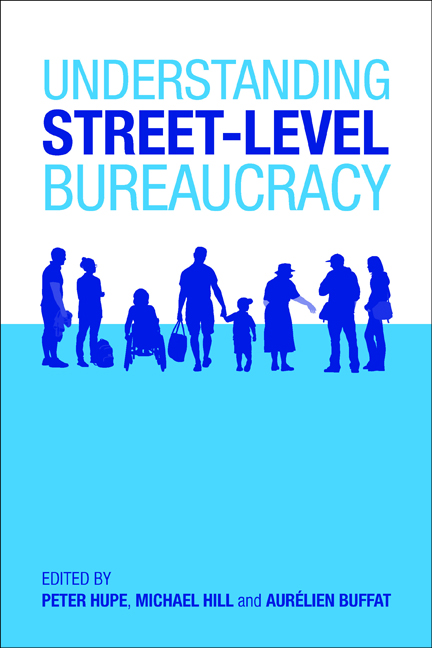Book contents
- Frontmatter
- Contents
- Biographical notes
- Preface
- Part One Introduction
- Part Two Delivering services and benefits: street-level bureaucracy and the welfare state
- Part Three Agents of the state: street-level bureaucracy and law enforcement
- Part Four Embedded in society: street-level bureaucrats as public actors
- Part Five The management of street-level bureaucrats
- Part Six The promise of professionalism
- Part Seven Conclusion
- References
- Index
Twele - Bureaucratic, market or professional control? A theory on the relation between street-level task characteristics and the feasibility of control mechanisms
Published online by Cambridge University Press: 08 March 2022
- Frontmatter
- Contents
- Biographical notes
- Preface
- Part One Introduction
- Part Two Delivering services and benefits: street-level bureaucracy and the welfare state
- Part Three Agents of the state: street-level bureaucracy and law enforcement
- Part Four Embedded in society: street-level bureaucrats as public actors
- Part Five The management of street-level bureaucrats
- Part Six The promise of professionalism
- Part Seven Conclusion
- References
- Index
Summary
Introduction
Street-level bureaucracy is two things: it is an effort to have policy implementation conform to general and abstract rules; and it is an effort to apply rules to specific and concrete cases. This central assumption informs our analysis of the managerial control of street-level action. The first assumes control of action through general regulation; the second assumes adjustment of action to specific case conditions. These are necessarily incongruent functions. Bridging the distance between general and abstract rules and specific and concrete cases requires action that cannot be fully defined by either. This is why, as Lipsky (2010) phrased it, street-level bureaucrats are policymakers. Street-level bureaucrats do not simply implement given rules in cases that can be fully understood on the basis of these rules, but instead translate rules into client-level decisions, building upon information (not fully defined in the rule) on clients’ conditions and upon expertise (also not fully defined) on client treatment.
There is an abundant literature on managerial and bureaucratic control over street-level bureaucrats. Meyers and Vorsanger (2003, p 246) argue that ‘the questions of whether, and how, policy making principals control the discretion of their implementing agents have dominated much of the empirical research’. Winter (2003) asks whether ‘bureaucrats [are] servants or masters, and to what extent … bureaucrats [can] be controlled by their political superiors’ and argues that there is ‘differentiated and limited control’ over street-level bureaucracies that varies according to the extent of information asymmetry. Meyers, Riccucci and Lurie (2001, p 165) argue that the achievement of ‘goal congruence’ between political control actors and street-level bureaucrats might increase ‘implementation fidelity and policy achievement’. The main thrust of the insights in this literature is that control over street-level action is limited and indirect.
These arguments conceptualise the issue of street-level control as placed on a single dimension of increased control versus increased street-level discretion. We disagree with this conceptualisation. Our central assumption is that street-level bureaucracy does not have one manifest function, but two: the control of policy implementation given existing regulations; and the translation of policy rules to clients given the street-level information on client conditions and expertise on client treatment.
- Type
- Chapter
- Information
- Understanding Street-Level Bureaucracy , pp. 205 - 226Publisher: Bristol University PressPrint publication year: 2015



